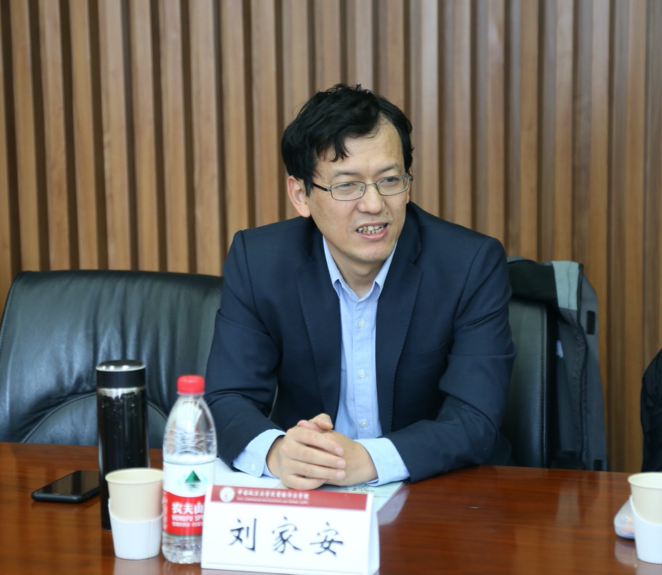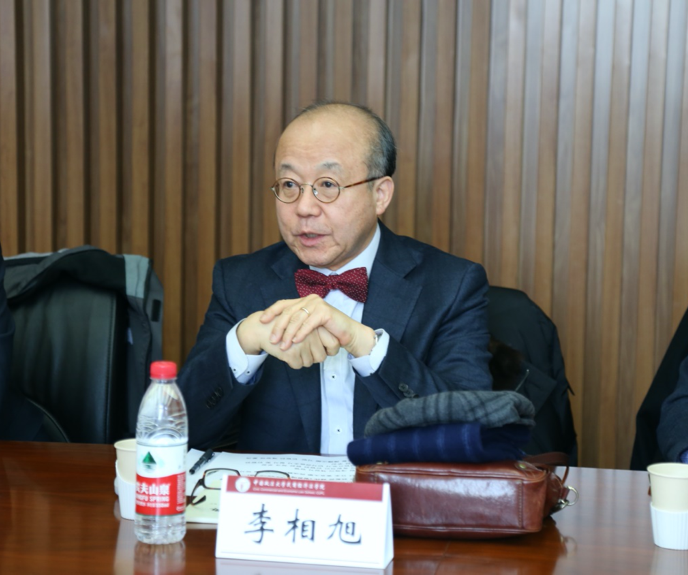On the afternoon of December 17, 2019, Professor Lee Sangwook of the Yeungnam University Law School, President of the Korean Family Law Society, President of the Korean Land Law Society, Vice President of the Korean Civil Law Society, gave a lecture entitled “Development Process and Prospect of Korean Civil Law” for teachers and graduate students of the Civil Law Institute of China University of Political Science and Law in the Conference Room B205 of the Research Building of Xueyuan Road Campus. The lecture was chaired by Professor Liu Jiaan, Director of the Civil Law Institute, and the reviewer and translator was Professor Wu Rihuan, Director of the CUPL Korea Law Research Institute.

Professor Liu Jiaan chaired the work
At the beginning of the talk, Professor Liu Jiaan extended a warm welcome to Professor Lee Sangwook and expressed his sincere gratitude to Professor Wu Rihuan for his hard work in the exchange of Chinese and Korean law. He also pointed out that the topic given by Professor Lee Sangwook today “Development Process and Prospect of The South Korean Civil Code” just coincides with the time when the Civil Code of the People's Republic of China (Draft) was published. Whether from the perspective of civil law or comparative law, Professor Lee Sangwook’s speech was very meaningful.

Professor Lee Sangwook gave the lecture

Professor Wu Rihuan translated
Professor Lee Sangwook greeted everyone in Chinese and gave a brief introduction on related contents in Korean. Mr. Wu Rihuan did translation for everyone and also briefed on the historical background of the development of Korean civil law to the participants. In the first part, Professor Lee Sangwook lectured on the purpose and setbacks of enacting modern Korean civil code. During the Korean Empire, South Korea enacted the Criminal Law Encyclopedia but did not formulate a civil code. When South Korea entered the era of Unification Government, that is, the unification politics of Japan, Japanese civil law Professor Ume Kenjirō was appointed as the leader of the reform of Korean law. Ume Kenjirō actively advocated the preparation of an independent civil code in Korea, and at the same time promoted the implementation of investigation on the civil custom. After the death of Ume Kenjirō, the compilation of the Korean Civil Code was shelved, and the “Report of Civil Custom Investigation” led by Ume Kenjirō was published in 1910. From the time of the Unification Government until December 31, 1959, Korean Civil Law was mainly applied in accordance with the Civil Code of Japan (Meiji Civil Law). At the same time, with regard to relatives and inheritance matters, they were applied according to Korean common law because Japanese civil law did not apply in this case. The second part of the lecture was the formulation and systematization of the Korean Civil Code. On February 22, 1958, South Korea promulgated the Civil Code, a total of 1111 articles (currently 1118 articles), which came into effect on January 1, 1960, mainly referring to the old civil law (in accordance with civil law), the pseudo-Manchu national law, and Germany Civil law, French civil law, etc. There are five parts of the Korean Civil Code, which are general provisions, property rights, claims, relatives, and inheritance. Professor Lee Sangwook summarized the differences between the Korean Civil Code and the old civil law from ten aspects. The third part is the revision process and main revised contents of the Korean Civil Law. After the enactment of the Korean Civil Code, there were 25 amendments, of which eight were important. The law on relatives and inheritance accounted for five of those amendments and the property law accounted for three. From the five amendments of relatives and inheritance law, we can see that women’s legal status has been continuously improved. Compared with the amendments of the relatives and inheritance law, the number and content of the amendments to the property law are less. The fourth part of the lecture was an introduction to the abandoned civil law amendment. In this part, Professor Lee Sangwook provided two amendments that were abandoned because the term of the Congress ended (2004 and 2010). The fifth part of the lecture was an introduction to the trial of civil law amendment in 2014. Learned from the failure of the previous two amendments, the South Korean Ministry of Justice chose to submit the amendments to Congress in parts. At the end of the lecture, Professor Lee Sangwook said that the amendment of the relatives and inheritance law were relatively smooth because the family law was a mirror of society and was adapted to social changes. The amendments to the Korean Property Law was not easy. At the same time, he pointed out that changing the current civil law to a more understandable law is the biggest issue in the revision of the Korean Civil Code.
After Professor Lee Sangwook finished his speech, Professor Jin Mei, Professor Kou Guangping, Professor Jin Wenjing and other participating teachers actively raised related questions, such as the registration system in Korea, the elements of infringement act, and the Korean legislative procedures, and had a discussion with Professor Lee Sangwook. At the same time, Professor Lee Sangwook also exchanged views with the teachers of Civil, Commercial and Economic Law School on whether the judicial interpretation of China belongs to the source of law, how the custom is specifically applied as the source of law, and whether the norms of consumer protection need to appear in the Civil Code.
The two-hour lecture ended successfully with the warm applause of the teachers and students present.

Group Photo


